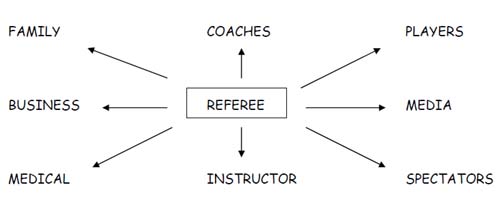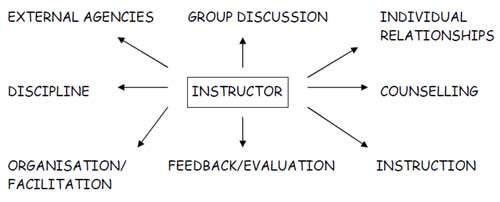 I vår artikkelserie "Mental Skills for Mentors and Referee Instructors" fra den meritterte dommerinstruktøren Alan Richardson fra England, bringer vi en ny artikkel som tar for seg elementer knyttet til dommerpsykologi. Serien på 10 artikler fokuserer på hvordan en mentor eller dommerinstruktør bør jobbe med å utvikle dommere, og ikke minst litt om de mentale ferdighetene som da er aktuelle. De fleste bør kunne plukke opp noen gode råd fra Richardsons artikler, både dommere og instruktører, og her kommer den åttende i serien. Dagens fokusområde er et grunnleggende tema for alle dommere: "Effective Communication".
I vår artikkelserie "Mental Skills for Mentors and Referee Instructors" fra den meritterte dommerinstruktøren Alan Richardson fra England, bringer vi en ny artikkel som tar for seg elementer knyttet til dommerpsykologi. Serien på 10 artikler fokuserer på hvordan en mentor eller dommerinstruktør bør jobbe med å utvikle dommere, og ikke minst litt om de mentale ferdighetene som da er aktuelle. De fleste bør kunne plukke opp noen gode råd fra Richardsons artikler, både dommere og instruktører, og her kommer den åttende i serien. Dagens fokusområde er et grunnleggende tema for alle dommere: "Effective Communication".
Part 8: Effective Communication
Flatter me and I may not believe you
Criticise me and I may not like you
Ignore me and I may forgive you
Encourage me and I will not forget you.
Basketball has always had its own language, covering physical and technical performance – the simple language of command and response. The sport during the last decade has become increasingly more complex and sophisticated. Coaches, Players and Officials are better educated and more independent. The Instructor/Mentor will have to deal with all this to create a cohesive group of officials that meets all challenges.

Referee and Communications (diagr. 1)
Communication in all forms has begun an unprecedented rise to the top of the sports agenda and an Instructor or Official without the ability to give and receive the information necessary for the highest levels of performance will suffer considerably.
It is essential for Instructors and Officials to be effective communicators; they must be able to interact successfully with a variety of people in a multitude of styles and situations.

Instructor and Communications (diagr. 2)
The extended language of basketball by which participants transmit their thoughts and feelings Involves:
- Self-talk - officials should recognise the importance of disciplining the inner voice to stay positive.
- Verbal - the majority of interactions occur on the move and verbal skills can be important for success.
- Listening - a major change for Instructors and some Officials, will be recognising the need to develop good listening skills.
- Connecting - communicating beyond technical needs can build personal relationships; Instructor – Official, Official – Official that build group chemistry.
- Body Language - it is not just what is said, but the way in which it is being communicated. Body language can betray inner feelings.
- Visual - most officials can retain no more than 3 points that an Instructor may make verbally. The use of a magnetic game-board or flip chart may help officials absorb more information.
- Technology - officials are now accustomed to receiving messages sent via new technology and Instructors must become familiar with these new opportunities such as audiotape, videotape, e-mail, CD-rom, DVD etc. in order to educate.
Clearly the Instructor or Official must communicate in a way that suits his/her personality and philosophy, but they should recognise that they can learn the skills required of all forms of communication. Such efforts will reap rewards.
Principles of Good Communicatioin
No matter what the context or the situation; some basic principles of communication are essential knowledge for both Officials and Instructors:
- Know and use the other person’s name. This relaxing and courteous.
- Be prepared by knowing what you want the outcome to be.
- Be empathetic. Try to understand the viewpoint of the other person. The goal is to connect, not defeat.
- Be relaxed and open, take care of negative body language.
- Face the person you are talking to and establish eye contact.
- Choose a style according to whom you are talking to. Simple is the best.
- Remain on task, do not become distracted.
- Be objective and control emotions.
- Be honest; do not say one thing and mean another.
- Occasionally seek clarification that your message has been received and understood.
- Repeat key messages; find alternative ways to emphasize them.
- Whenever possible lighten up things with a little humour.
- Try to understand and make allowance for different cultures.
- In concluding the conversation try to sum up what has been agreed.
Breakdowns in Communication
By understanding barriers to communication, Officials and Instructors may be able to prevent some of them from developing. Examples of communication breakdowns are:
- Assumption - Instructors assume the Officials know what is required of them and Officials assume that Instructors know how they feel.
- Difference of opinion - although unavoidable, differences must lead to more communication, not less. Parties should always agree to disagree.
- Personality clashes - this too is inevitable, but with communication a common ground can be established so that personal issues can be put aside for game needs.
- Role conflicts - Officials will resent fulfilling roles that do not fit their perception of their best contribution. E.g. experienced referee nominated as Umpire. Instructors can ease matters by sharing their reasons.
- Power struggles - groups of Officials are always evolving and the ranking order will always be considered important. Unless the Instructor settles this by clear and shared communication, matters may deteriorate.
- Cultural misunderstandings - great care must be taken to recognise and understand culturally influenced communication (east v west, north v south). Officials must consider the words they use and their body language when expressing their message. Check that what you have said is understood.
- Perceived injustices - basketball often requires instant decision-making producing opportunities for conflict. Instructors must discipline Officials to respond positively to such conflict. Feedback on their responses enables tension to be released.
- Role changes - events occur everyday in professional sport (injury, loss of form, non-selection for prestigious nominations) that force Officials into role changes and possible loss of status. It is essential that Instructors/Mentors are sensitive to this and prevent any decline in communication by being supportive.
Creating a Communication Network
In any sports environment it is essential to try and achieve a supportive climate with positive communication and a shared ownership of the problems facing the game.
Despite the changing nature of teams, competitions and groups of officials, certain measures can help accommodate the changes and maintain a positive climate:
- Honesty - always try to be clear, consistent and direct in communication, honest with no hidden agenda.
- Feedback - officials need constant feedback. Instructors should spend time preparing instruction and comments for all officials.
- Stability - too many changes in routine can upset the mental and emotional stability within a group of officials, increasing anxiety and decreasing communication.
- Continuity - being a member of a particular group is important to every official. Continuity within a group maintains positive attitudes and communication – therefore good performance.
- Core and Fringe - every group is likely to have core officials, those who officiate at major games regularly and those who are ‘rookies’, working at different levels. These officials need help from Mentors/Instructors.
- Video analysis - the use of videos, the most natural form of communication, is now widespread in officials’ education and training.
- One to one - ultimately, basketball is a personal challenge and the most important communications are the one to one discussions between individuals, especially Instructor – official and Mentor – rookie.
Summary
With the increasing sophistication and athleticism in basketball, it is essential that officials can communicate effectively. Instructors and Officials need training in not only traditional verbal and non-verbal communication but also in the application of new technology.
Alan Richardson
By understanding barriers to communication, Officials and Instructors may be able to prevent some of them from developing. Examples of communication breakdowns are:
- Assumption Instructors assume the Officials know what is required of them and Officials assume that Instructors know how they feel.
- Difference of opinion although unavoidable, differences must lead to more communication, not less. Parties should always agree to disagree.
- Personality clashes this too is inevitable, but with communication a common ground can be established so that personal issues can be put aside for game needs.
- Role conflicts Officials will resent fulfilling roles that do not fit their perception of their best contribution. E.g. experienced referee nominated as Umpire. Instructors can ease matters by sharing their reasons.
- Power struggles groups of Officials are always evolving and the ranking order will always be considered important. Unless the Instructor settles this by clear and shared communication, matters may deteriorate.
- Cultural misunderstandings great care must be taken to recognise and understand culturally influenced communication (east v west, north v south).
Officials must consider the words they use and their body language when expressing their message. Check that what you have said is understood.
· Perceived injustices basketball often requires instant decision-making producing opportunities for conflict. Instructors must discipline Officials to respond positively to such conflict. Feedback on their responses enables tension to be released.
· Role changes events occur everyday in professional sport (injury, loss of form, non-selection for prestigious nominations) that force Officials into role changes and possible loss of status. It is essential that Instructors/Mentors are sensitive to this and prevent any decline in communication by being supportive.
